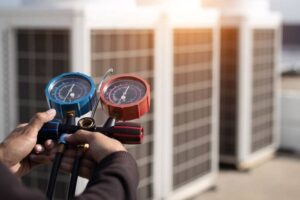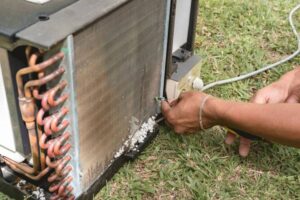In the ever-changing landscape of climate control, the quest for comfortable indoor environments has always been accompanied by the challenge of energy efficiency. Over the decades, air conditioning services have continually evolved, striving to balance the need for comfort with environmental responsibility. This blog explores the fascinating journey of how air conditioning services have adapted over time to prioritize energy efficiency, paving the way for sustainable cooling solutions.
The Early Days: From Ice Blocks to Mechanical Coolers
Air conditioning’s humble beginnings trace back to ancient civilizations, where inventive minds used various methods to cool indoor spaces, such as using ice blocks or harnessing the power of water evaporation. However, it wasn’t until the late 19th century that mechanical cooling systems emerged, revolutionizing the concept of indoor climate control.
The Birth of Refrigerants: Balancing Performance and Environmental Impact
As air conditioning systems became more prevalent, the choice of refrigerants played a crucial role in their energy efficiency. Early refrigerants like ammonia and sulfur dioxide, while effective at cooling, posed significant safety and environmental hazards. The quest for safer alternatives led to the development of chlorofluorocarbons (CFCs) in the mid-20th century. However, the discovery of their harmful impact on the ozone layer prompted a shift towards more environmentally friendly options, such as hydrochlorofluorocarbons (HCFCs) and hydrofluorocarbons (HFCs).
The Rise of Energy-Efficient Technologies: From SEER Ratings to Inverter Technology
In recent decades, technological advancements have propelled air conditioning services towards greater energy efficiency. One significant development is the introduction of Seasonal Energy Efficiency Ratio (SEER) ratings, which measure the efficiency of air conditioning systems over an entire cooling season. Higher SEER ratings indicate greater energy efficiency, encouraging consumers to opt for more eco-friendly options.
Another breakthrough in energy-efficient cooling is the adoption of inverter technology. Unlike traditional air conditioners that operate at fixed speeds, inverter-based systems adjust their compressor speed to match the cooling demand, resulting in significant energy savings and improved comfort.
Smart HVAC Solutions: Optimizing Efficiency Through Automation
In today’s digital age, the integration of smart technology has revolutionized air conditioning services, offering unprecedented control and efficiency. Smart thermostats allow users to remotely monitor and adjust their cooling settings, optimizing energy usage based on occupancy patterns and weather forecasts. Additionally, predictive maintenance algorithms can detect potential issues before they escalate, ensuring optimal performance and minimizing energy waste.
Looking Ahead: The Future of Sustainable Cooling
As concerns over climate change continue to mount, the demand for sustainable cooling solutions has never been greater. Innovations such as solar-powered air conditioning, geothermal heat pumps, and passive cooling techniques hold promise for a greener future. Furthermore, ongoing research into next-generation refrigerants aims to eliminate harmful emissions and further reduce the carbon footprint of air conditioning systems.
A + ESC Air Conditioning Repair – Prioritize Energy Efficiency
The evolution of air conditioning services from simple mechanical coolers to sophisticated energy-efficient systems is a testament to human ingenuity and our commitment to environmental stewardship. By prioritizing energy efficiency, air conditioning services not only enhance comfort but also contribute to a more sustainable future for generations to come. As technology continues to advance, the journey towards greener cooling solutions is far from over, promising exciting possibilities for the future of indoor climate control. Call A + ESC Air Conditioning Repair for service at 954-687-5950




